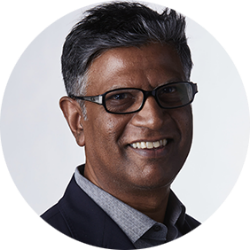
Don Mal is the co-founder and CEO of Vena Solutions. Vena is one of the fastest growing Corporate Performance Management solutions in the market. Over the last five years they have enjoyed 100% year on year growth. A veteran in sales he led the North American sales teams for Clarity Systems and global sales for Cognos FSR, both IBM companies.
ET: Who is your inspiration and why?
Don Mal: My kids. I have two girls, teenagers, who are very much Millennial generation kids. They tend to encounter the kind of stereotype but they’re both very hardworking. It blows me away actually how hard they have to work to, in their perception, be successful given the competitive and very different environment they’re growing up in than what we grew up in 20, 30 years ago.
ET: How would you describe your leadership style?
Don Mal: I’m a big believer in authentic leadership where we focus more on leading with humility, authenticity and focusing more on emotional intelligence yet still willing to work hard and take chances.
Vulnerability’s the big part of that. What we do is we get in the trenches with our folks, with our teams. We’re not in a corner office, we’re in an open space. We all work together and we all take the same leadership courses. We’re very much inclusive and part of that is demonstrating that vulnerability through articulating that authentic leadership style.

ET: What are your personal challenges for the next 12 months?
Don Mal: I think scaling from a founder-led business to a more professional executive leadership team that we have hired. The three of us, myself, George and Rishi, founded the company six years ago. In the last year when we raised our proper series A round, we basically brought in three new C-level executives. One was the head of our people, Chief People Person, one was our Chief Revenue Officer for sales and marketing and the other was customer success, our service and support organisation.
Our Chief Revenue Officer has now been promoted to COO. So that shift from leading the team as founders to now being more professional, in a sense, of broadening that executive leadership and then scaling over the next 12 months with that new leadership team.
ET: What was your darkest business day and how did you overcome it?
Don Mal: To be honest, I think I had a dark business year. Once in my life I had a personal tragedy. My cousin, who was my best friend, was killed in an accident. I was 27, I was a young sales leader at the time. I had a very difficult time. For about a year I couldn’t actually sell anything.
ET: Second half of that question is how did you overcome it?
Don Mal: It was time. It took about a year to come out of that funk. And it was amazing because it was very subconscious. It wasn’t for the lack of me just getting up every day and going to work and trying as hard as I ever did. There was a subconscious impact where I think just that energy and spirit was missing because of that [tragedy].
ET: What was your proudest moment?
Don Mal: Having built this company from scratch. We started at Starbucks, the three of us, thinking about a business we wanted to build. Now we are in a preeminent real estate location in Toronto, in Liberty Village, having 200 people come to work every day. Our first Town Hall that we had with 200 people was also our company kick off out here in January, when we moved into our new office. Standing here in front of 200 people, knowing we’re growing another 60% this year, was a very proud moment for us.
ET: Could you share a tip for a newly started CEO?
Don Mal: Don’t wait to sell your product or services. If you have a great idea, get out there and sell it because ultimately people buy it and you can solve any deficiencies in your products or services because you now have customers and you’re making money. A lot of young entrepreneurs will wait until everything is perfect, and then it’s too late. You’ve spent all your money and resources and you can’t actually go to market.
ET: You raised 30 million in your series B funding round. For companies in a similar position, do you have any advice around how to approach that process?
Don Mal: It’s important that you actually have a multiple offer or bid type of process where you don’t just take the first deal that comes along. Hiring a banker is a good idea to run a formal process. We did that and we got multiple offers. We ended up with a very good deal for the business with the right partner. Choose your partner carefully because they’re going to be on the board and the last thing you need is someone that’s not a good fit for your culture and the way you want to lead the business.
ET: What was the latest business book you read, your favourite book or podcast?
Don Mal: I think most recently “Crossing the Chasm“, Geoffrey Moore. We as a business last year were looking to cross that chasm to reach that early majority. That one I would say would be most relevant in our own business evolution, as one also that I’ve most recently been referring to.
ET: What’s the worst and the best decision you’ve made as CEO?
Don Mal: The worst decision was when we first started the business. We went down a path of thinking we could be everything and anything to everybody with our platform solution. It set us back three to six months out of the gate. We felt that we could be a platform for any department within any organisation to use for their spreadsheet-based processes. We found that we were running up against SharePoint and lots of other document management systems and there was a lot of confusion about what we did. So, we quickly had to pivot back to focus on the office of finance and CPM and that’s when we really started to take off. That would be probably one of my worst decisions early on as a CEO.
The best decision was that I decided early on that we wanted to set up a sales channel that was going to be focused on mid-market. It would be a low-cost sales channel, more of an inside sales kind of framework. Inside sales meaning that we have almost 40 people on the phones that are selling into the mid-market.
That part of our business is growing faster than any other part of our business. It’s the most efficient sales model that we have and it’s generating the most revenue for the company. I’m glad that we did that investment early on. I hired some good leadership there, invested in that leadership, allowed them to take control, upscaling themselves to be able to run that as an effective business unit.
ET: What’s your vision for Vena?
Don Mal: The sky is the limit here. The total adjustable market in North America alone is 40,000 companies and only 5,000 have actually implemented software solutions for what we do. So over 80% of the market is still using spreadsheets and available for us to penetrate. It’s not a winner-take-all market. There’s room for several vendors to do really well. That’s one thing. But if you think about it, only Facebook has as many users as Microsoft Excel. We are selling to an audience that is using a ubiquitous technology. They’re very familiar with and love Microsoft Excel. We believe that Vena can be a $100 million revenue business in the next three to five years. That is the trend and track that we’re on.
ET: People are trying to disrupt Office, is that a threat or do you not see that as happening or existing? Do you just think Excel is too far embedded?
Don Mal: The statistics are there. Microsoft currently enjoys 90% of the office productivity space. It’s declining by one or two percent a year. So, you know what? Google Docs and a bunch of other vendors are trying to crack into that space. They will definitely put a dent in it over the next five to ten years. It is so ubiquitous with Microsoft Excel and now online Excel that it would be very difficult for finance users to really dramatically shift quickly to other technologies with different syntaxes and everything else.
The other thing that we’re doing as a vendor though is we want to remain office productivity agnostic. We do have in our roadmap Google Docs support and if Salesforce comes up with their own office productivity suite certainly we’ll look to integrate and work with that as well. We want to be agnostic of the office productivity tools that you use while still leveraging our approach to creating more efficiency around what those tools can do natively.
ET: What’s on the radar in terms of future technology for Vena?
Don Mal: We see a huge opportunity and we’re really excited about taking Vena into the revenue performance management space. We believe that corporate performance management traditionally has been companies that want to effectively look at their past financial performance, forecast future financial performance and analyse modelling from their past to the future. The emphasis and focus will need to be more on revenue.
We are very excited about launching more revenue performance management functionality that will allow companies to better dissect and analyse what marketing programmes are effective for lead generation, have the highest conversion rate, identify the best territories and deliver the best compensation model for our sales people.
All those things are a holistic view of how they can be better at generating revenue. We’ve got lots of customers starting to use Vena for that and we’ve been enhancing our product to do more of revenue performance managements. Probably the most exciting part of where we see us from a technology standpoint moving to the future.
ET: I’d be interested in your view on blockchain as a technology. Is that something you’re looking at?
Don Mal: It’s interesting. I see blockchain as highly disruptive obviously in the Fintech space as a means of a channel to manage the collection of funds and money, and distribute those commissions and everything. There’s so much opportunity for blockchain. I think within our revenue performance management there may be something there for us to look at how we might be able to integrate with a blockchain type of technology. But right now, it’s not something that’s immediately on our radar.
ET: In terms of deployment, what are customers looking for? And how do they balance speed, flexibility and return on investment?
Don Mal: Customers want quick time to value. Vena is very much aligned with that requirement for our customers. We are able to leverage the existing investments in their spreadsheet models and we simply renovate and automate. We are able to get quick time to value for our clients. That’s the number one thing that they value. They balance that with obviously making sure that they’re getting clean data, so integration with their source systems as well as making sure that they’re planning for an implementation that can support future requirements. We always think big but we start small and we get quick wins and that’s how we like to run it.
ET: What keeps you up at night?
Don Mal: Nothing I would say keeps me up at night, but if anything causes me to think about the business at night it would be more about how can we capitalise on this massive opportunity? How can we make sure that the business is properly capitalised to take advantage of this opportunity? As I mentioned, it’s not a winner-takes-all but it is a bit of a land grab. The companies that are quickest to be able to grab market share are the ones that will be the most successful.
ET: How do you see the company changing in the next two years and how do you see yourself creating that change?
Don Mal: The main thing, as I mentioned, was scaling from 200 people now and 400 or so customers. I see us in two years having three to four hundred employees with 1,000 customers. The biggest change is going to be scaling the business with a lot of infrastructure and processes. That’s where I see a lot of the investment in time and energy hiring the right people to implement the proper infrastructure technology and processes to continue to scale the business. My role is really to make sure I have the leadership that can make that happen.
ET: How do you approach that challenge of rapid growth while maintaining your culture?
Don Mal: That’s a really good question because we hear it from our employees. Our employees still like the start-up feel. We’re in a very much start up physical environment. In our new office in Liberty Village, it’s a cool space, a lot of Millennial culture here in terms of the DNA of the business. They like the founder dynamic as well in terms of still having founders somewhat leading the company. The biggest challenge is how do we scale as I mentioned earlier. How do we transition effectively from founder led to more executive team led business with non-founders that are also now leading the business? Making sure that the leadership is aligned also down the chain where you’ve got your vice presidents and your directors, not just the C-levels, that everyone aligned so that then all of the team can be aligned with the vision and culture of the business?
We spend a lot of time on making sure we’re continuing to ingrain the culture while we scale the business. It’s one of the things where we have lots of great values. We have core values guiding our principles. There are posters of those all over the office so that we continue to drive. We award and reward our employees for following those values. I think that’s some of the common thread or glue that we want to keep together as we grow and scale.
ET: How do you prioritise your day and on what and how much time do you spend in different areas?
Don Mal: A lot of my time is spent now with investors, analysts and journalists. I do spend a lot of time more around promoting the company as well as continuing to make sure that we are, from a funding standpoint, always looking at how we’ll continue to capitalise business. From a strategic standpoint I looking at these opportunities like revenue performance management and go to market partnerships. We are about to potentially announce another large partnership at the end of the year so working more on those big picture things that a CEO really should spend more time on. Less operational.
ET: What’s the endgame of Vena or what’s your next strategic goal?
Don Mal: For us it’s just about continuing to build a great company. What happens in the end is going to be whatever happens in the end. We don’t think about it too much to be honest. The big, immediate goal, the interim goal is what’s called the 40 Club Rule. As we become a $40 million revenue company that’s growing at 40% per year at a minimum with 40% gross margin, there’s something called the 40 Club Rule. Only one in several hundred venture-backed companies make it to that and we’re on the verge of that in the next year. We believe we can be a $100 million company.
ET: What’s the one question you’d like to ask another CEO to answer?
Don Mal: I think it’s probably around where we are as a company in terms of evolution, scaling the business. How have you effectively transitioned from founder led to a more executive led leadership while still keeping that culture that you talked about, and that spirit of that founder led business? But I have yet to ask that question of another CEO.
ET: Thank you very much for your time Don.
Don Mal: Thank you Steve.


























